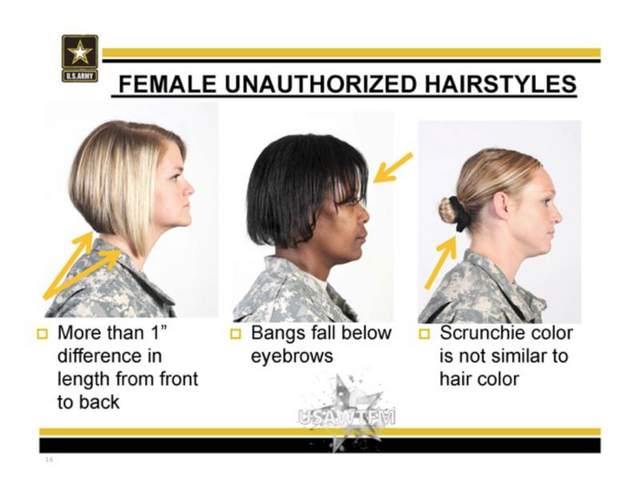The Army's new hair rules, which ban a number of styles popular among black women, were approved only after surveying hundreds of senior enlisted female soldiers as part of a focus group led by a female sergeant major, an official said Wednesday.
The hotly anticipated update to Army Regulation 670-1 published Monday. The controversy started weeks earlier, however, when a PowerPoint presentation leaked online showed a number of black female models with "unauthorized" hairstyles to include large braids and twists.
Some black female soldiers wrote Army Times, expressing concern the new regulation was unfair and that it effectively outlawed natural hair. A sergeant in the National Guard took another measure: she petitioned the White House, calling for the Commander in Chief to order reconsideration of the rules. The petition has garnered more than 7,900 signatures as of Wednesday afternoon. To compel a White House response, the petition must reach 100,000 signatures by April 19.
The allegations against the Army regulations have made national headlines and generated thousands of comments. Some are defending the Army rules and others are accusing leadership of being "racially biased."
Army officials have not responded directly to the allegations. Officials speaking on background said it's premature to discuss any possible revisions to the regulations.
Details of the focus group of female soldiers were not immediately available, but officials said the feedback was valuable and an important part of the process.
The update to AR 670-1 contains a number of clarifications for Army-appropriate hairstyles. Some of the unauthorized hairstyles that have generated debate:
• Twists or multiple braids bigger than a quarter of an inch in diameter are unauthorized.
• Dreadlocks of any style are unauthorized.
• Cornrows can be worn, but must be uniform and no bigger than a quarter of an inch.
Sgt. Jasmine Jacobs started the White House petition to seek reconsideration of the hairstyle rules in the Army's new appearance and grooming regulation. Jacobs wears her hair in twists.(Photo: Courtesy Jasmine Jacobs)
Sgt. Jasmine Jacobs, a public affairs soldier in Atlanta, started the White House petition. She wears her hair in two twists and said it's a go-to style for black female soldiers going to the field because it's easy to maintain.
The Army defines "twists" as two distinct strands of hair twisted around one another to create a rope-like appearance.
Jacobs' hair is naturally thick and curly, making it impossible to pull into a bun, Jacobs said.
"Most black women, their hair doesn't grow straight down, it grows out," she said. "I'm disappointed to see the Army, rather than inform themselves on how black people wear their hair, they've white-washed it all."
There may be a glimmer of hope for Jacobs and other women hoping to maintain their current hairstyle: the regulation includes a waiver program that grants exceptions on a case-by-case basis.
The office of the deputy chief of staff for personnel "has the authority to approve exceptions," according to language in AR 670-1.
All waiver requests must be endorsed by the commander or senior leader of the requesting activity and forwarded through their higher headquarters, according to the regulation.
Soldiers also can fight the regulation via official Army channels. Army Form 2028 allows individuals to submit recommendations or suggestions for changes to an Army regulation. The forms are sent to the deputy chief's office.
Officials point out that some of the unauthorized hairstyles in the new AR 670-1 are not new but the old regulation was too vague.
Twists and dreadlocks have been prohibited since 2005, but the regulation at the time did not clearly define the specific hairstyles, Army spokesman Paul Prince has said.
With clarified rules, soldiers should expect increased enforcement.
Rules in the other services
The Army's newly enforced hairstyle rules are similar to those of the Marine Corps, which in December took a hard line against a number of hairstyles it considers "faddish" or "eccentric."
Banned hairstyles include those that involve "hair sculpting," including "eccentric directional flow, twists, texture or spiking," according to the Marine Corps message.
Other banned styles include "locks and twists" — not including French rolls or twists — and buns or braids with loose hair extending at the end, except within the recently approved "micro braid" or "multiple braid" style.
The Navy, whose regulation was last updated July 2011, allows multiple braids that are uniform in size and tightly woven to present a neat, professional and well-groomed appearance.
Symmetrical cornrows are allowed for those with short hair, and the "appropriateness of a hairstyle shall also be judged by its appearance when headgear is worn," according to the regulation.
Headgear should fit snugly and comfortably around the largest part of the head without distortion or excessive gaps.
In the Air Force, female airmen are allowed to have braids, micro braids and cornrows that are in a natural looking color and conservative. Multiple braids should be uniform in dimension, small in diameter, and show no more than a quarter of an inch of scalp between the braids.
Dreadlocks, shaved heads, flat tops and high-and-tight haircuts are not authorized for female airmen.


